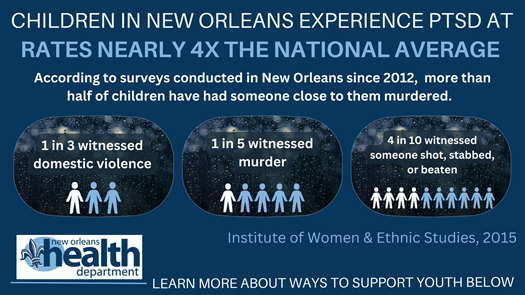Prevention for Children & Families
Children of all ages may be impacted by violence in and out of the home.
- Each year, millions of children witness violence between their parents or caregivers.
- Children that witness violence in the home are more likely to experience intimate partner violence later during adolescence and adulthood as a victim of abuse - or as a person who causes harm.
- Homicide is a leading cause of death during pregnancy and up to 1 year postpartum in the US, and most pregnancy-associated homicides are caused by an intimate partner.
- When compared to pregnant women nationally, pregnant women in New Orleans are 3x as likely to be violently injured.

Protective Factors for Children & Parents
Protective factors lower the risk of harm and support the healthy development of children. Factors include conditions or attributes in individuals, families, and communities that promote the health and well-being of children and families.
By using a protective factors approach, child welfare professionals and others can help parents find resources and supports that emphasize their strengths while also identifying areas where they need assistance, thereby reducing the chances of child abuse and neglect.
U.S. Department of Health & Human Services Prevention Resource Guide
Providing Basic Needs
You can help support proper nutrition & basic healthcare for your child!
- Providing regular & healthy meals,
- Making sure they drink enough water,
- Encourage daily physical activity,
- and Support recommended sleeping habits.
- Schedule annual well check-ups,
- Make as needed sick visits,
- Follow your pediatrician's vaccination schedule,
- Visit the dentist & get their eyes checked,
- and Provide at-home acute care.
Nurturing, Supportive Parenting, & Boundary Setting
Strong, warm bonds help children develop trust that caregivers will provide what they need to thrive, including love, acceptance, positive guidance, and protection.
A child's relationship with a consistent, caring adult in the early years is associated later in life with better academic grades, healthier behaviors, more positive peer interactions, and an increased ability to cope with stress.
Children thrive when parents provide not only affection but also respectful communication and listening, consistent rules and expectations, and safe opportunities that promote independence.
Social Connections, Resilient Caregivers, & Support
Children learn how to express and communicate emotions, self-regulate, address conflict, and make friends by modeling their parents/caregivers behaviors.
A child's social and emotional competence is crucial to sound relationships with family, adults, and peers and delayed social-emotional development may obstruct healthy relationships.
The YMCA: Social and Emotional Competence of Children
Learning to effectively navigate the stresses of everyday life, as well an occasional crisis, is resilience!
Multiple life stressors – including financial stressors – may reduce a parent's capacity to cope effectively with the typical day-to-day stresses of raising children. Everyone deserves help when parenting gets tough.
Learn more about promoting coping mechanisms & supported parenting:
Strengthening Families: A Guide for Parents
National Parent Helpline
Education
Promote healthy learning early on by encouraging emotional self-regulation, effective coping & problem-solving skills, and conflict resolution tactics.
Regular attendance, opportunities for engagement, celebrated achievements, and clear expectations for behavior are all part of a supportive learning environment.
New Orelans Public Library Early Literacy
NOLA Public Schools
Knowledge of Parenting & Child Development
Raising children is extremely hard work! You are not alone, there are resources out there to help you and your family along the way.
CDC Positive Parenting Tips
Healthy Start New Orleans
New Orleans WIC
The Parenting Center at Children's Hospital
Sesame Street Took Kits
We PLAY Center
Zero to Three: Resources for Families
Additional Sources:
Called to Care, New Orleans Children & Youth Planning Board
Domestic Violence and Children, American Academy of Child & Adolescent Psychiatry
Homicide During Pregnancy and the Postpartum Period in the United States, 2018-2019, Journal of Obstetrics & Gynecology
Louisiana Pregnancy-Associated Mortality Review (LA-PAMR), Louisiana Department of Health
The National Intimate Partner and Sexual Violence Survey, Centers for Disease Control
